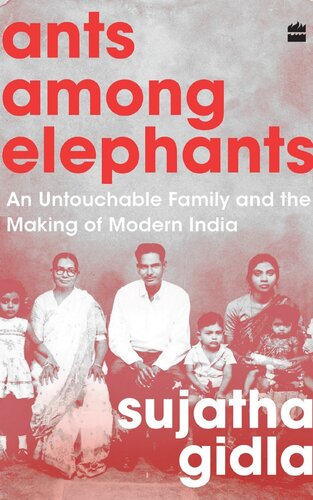
Ants Among Elephants
An Untouchable Family and the Making of Modern India
کتاب های مرتبط
- اطلاعات
- نقد و بررسی
- دیدگاه کاربران
نقد و بررسی

Starred review from May 22, 2017
In this brilliant debut, Gidla documents the story of her resilient family and India’s modern political history. Gidla grew up in India as an untouchable, the lowest category in India’s caste system, and now works as a subway conductor in New York City. In this epic, she shares intimate stories of her uncle Satyam, a revolutionary poet and steadfast communist; her uncle Carey, a hapless yet ardent supporter of Satyam; and her mother Manjula, the core of the family’s strength. Her uncle Satyam was a political organizer within the movement that won its demand for statehood for Andhra Pradesh from former president Nehru. Gidla eloquently weaves together her family narratives with Indian politics, specifically focusing on the practices and consequences of caste inequality. The book is also a fascinating chronicle of the corruption within and political battles between India’s Congress Party and its Communist Party. Gidla is a smart and deeply sympathetic narrator who tells the lesser known history of India’s modern communist movement. The book never flags, whether covering Satyam’s political awakening as a young and poor bohemian or Manjula’s rocky marriage to a mercurial and violent man. Gidla writes about the heavy topics of poverty, caste and gender inequality, and political corruption with grace and wit. Gidla’s work is an essential contribution to contemporary Indian literature.

May 15, 2017
Firsthand account of the lives of people categorized as the lowest of the low in India's caste system.Trained as a physicist, the daughter of teachers, Gidla is nonetheless an untouchable, which she describes as something like the racism African-Americans are forced to endure; though it is not built on identifiable markers such as skin color, it is nonetheless a pervasive indignity. "Because your life is your caste," she writes, "your caste is your life." Yet, as her narrative demonstrates, it is possible to slip around the caste system by becoming something even more untouchable than an untouchable: namely, an outlaw, and in the case of Gidla's uncle Satyamurthy, the founder of "a Maoist guerrilla group recently declared by the government to be the single greatest threat to India's security." Charming and clever, SM, as he is known, is still committed to revolution even in old age, given to disappearing in the jungle to fight and organize. Another uncle, who also figures in the author's account, escaped from the weight of untouchability with the help of alcohol, which felled him before he could fully contribute his memories to her narrative. That searching family history reaches back into a past in the southern state of Andhra Pradesh, where, even in the 1800s, her ancestors were living as nomads who "worshipped their own tribal goddesses and had little to do with society outside the forest where they lived." When enfolded by caste society, though without caste themselves, they became untouchable, meaning, literally, that any contact would defile even the lowest-caste Hindu. That system of belief, writes Gidla, affected every aspect of their lives, determining where they could live and how they could work, so much so that even in his revolutionary movement, SM had to field questions of caste at every turn. Students of civil rights activism and South Asian societies will find much of value in Gidla's far-ranging narrative, dense with detail and anecdote.
COPYRIGHT(2017) Kirkus Reviews, ALL RIGHTS RESERVED.

June 1, 2017
In this compelling, immersive portrait of India, beginning just before independence in 1947, the author shares her family's personal stories, focusing closely on her uncle Satyam, who became a famous poet, political agitator, and influential Communist Party member. Gidla explores the explosive nexus of ethnic, religious, and nationalist energies that converged across the country, from her small village community of converted Christians to the large rallies of Communist supporters, 10,000 strong. The fast-paced, often-intense action takes place in captivating, fluid prose that retains an evocative vocabulary from Gidla's native Telugu language, such as when the dora sent his goondas to round up the sangham leaders and drag them to his gadi, where they were tortured. Just as fascinating as the stories she tells of her family members is the life of the storyteller herself: born into the untouchable social class, Gidla obtained a college education and moved to New York City, where she now works as a subway conductor. At once intimate and ambitious, Gidla's book succeeds in placing the nuances of memoir within a grand historical context.(Reprinted with permission of Booklist, copyright 2017, American Library Association.)

























دیدگاه کاربران